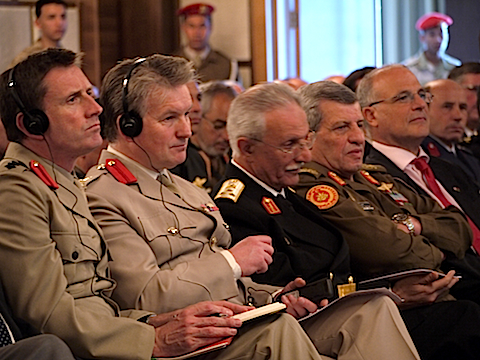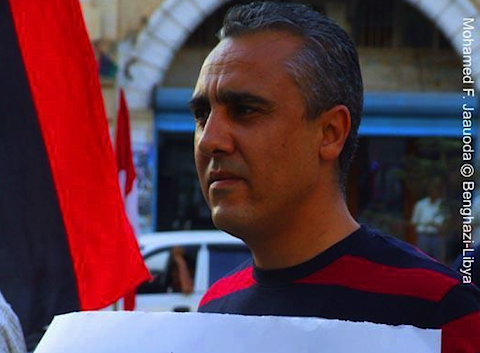By George Grant.

Tripoli, 3 December:
Some 70 officers from all four service arms of the Libyan armed forces have begun a three-day . . .[restrict]training seminar with the British military in Tripoli.
The course is designed to introduce the Libyan military to the overall strategies and concepts necessary to develop a modern, professional army, navy, air force and air defence. The programme will provide a broad overview of everything from how to develop advertising strategies that will appeal to potential new recruits up to staff and command training for officers at the senior level.
“The purpose of this course is to introduce the Libyans to what is called a systems approach to training”, said Colonel Tim Kingsbury, defence advisor at the UK embassy in Tripoli. “That means first understanding your requirements, what you want to achieve, and then designing a training system that meets that.”
This is the first time that such a model has been attempted in Libya by any country since last year’s revolution, and comes as part of a broader engagement process that has seen ten places made available for Libyan officers at training academies in the UK.
To date, four Libyan naval officers have been sent to the UK naval academy in Dartmouth, with two more expected in 2013, whilst two places apiece have also been provided at the RAF training academy in Cranwell and the army’s Royal Military Academy Sandhurst.
In September, Chief of Staff General Yousef Mangoush dispatched six officers from his office to the UK for English language training to enable them to engage more effectively with the international community.
“We believe that the British are the ideal partner for this kind of training”, said Commador Hassan Bushnak, Chief of Staff of the Libyan Naval Force. “There have been relations between the British and Libyan armies since the 1940s when the UK helped establish the Libyan armed forces, and we have found the British experience of training most dependable.”
Amongst the main objectives of the course is to facilitate the Libyan military to become more innovative and versatile in the way it approaches and seeks to overcome problems it confronts. “We want to help the Libyan armed forces move away from a formulaic approach to a more analytical one”, said Commander David Robertson, the UK’s embedded advisor in the Libyan navy.
“There needs to be a morph from the very Soviet system that the armed forces in Libya have been based on, with a very Russian-style training programme, towards a more open way of thinking”.
Amongst those present on the British side were Brigadier James Hockenhull, military head the Department for International Policy and Planning in the Minstry of Defence, and British Ambassador to Libya Michael Aron. On the Libyan side were Deputy Chief of Staff Brigadier Abdusalam Al-Hassi along with the heads of the the army, navy and air defence force. General Mangoush was slated to attend, but is said to be absent on account of ongoing difficulties in eastern Libya. [/restrict]








